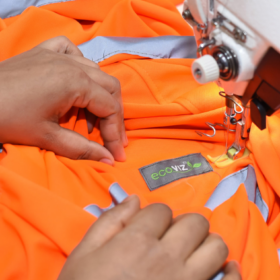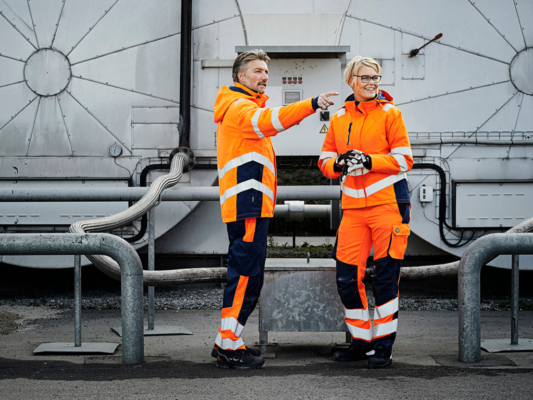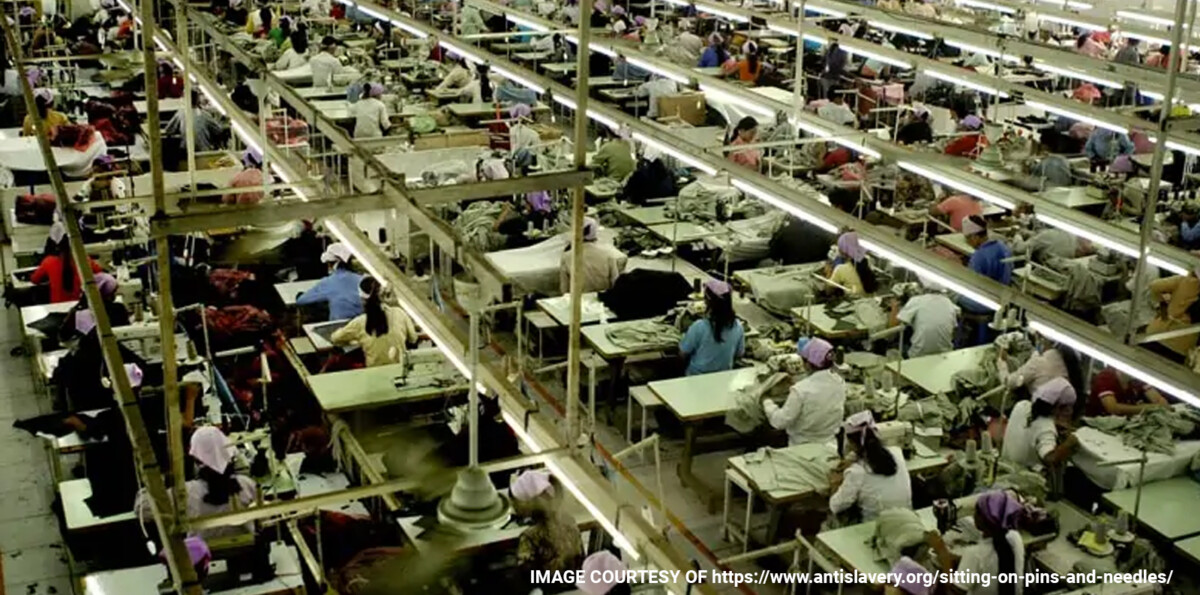No products in the basket.
Health & Safety, Sustainability
Removing The Shackles – Tackling Modern Day Slavery In The Textile Industry
The earliest industrialised production of clothing in Britain was synonymous with dangerous working conditions, poverty, poor wages and child labour. Following the efforts of numerous reformers, legislation was introduced in the late nineteenth and early twentieth centuries that outlawed exploitative practices. As the industry grew, conditions improved with trade unions also securing further improvements for workers relating to pay and general working conditions.
During the late 1970’s however, textile manufacturers were faced with a steady decline in domestic textile manufacturing as companies began to produce offshore. Output fell by 65 per cent between 1979 and 2013 with jobs in the industry falling by 90.1 per cent (from 851,000 to 85,000).
Elsewhere, particularly in Asia, the expansion to offshore production saw textiles, clothing and footwear sectors expanding rapidly. The growth created enormous employment opportunities for developing countries but the jobs came at a cost. Harsh working conditions, extremely low pay, the abuse of human rights and environmental neglect have all been documented. The most common issues including unsafe factories, long hours and the denial of labour rights such as collective bargaining and social security.
Whilst offshore expansion has its benefits on both sides, the textile industry highlights the inequalities between the global North and South. With almost unlimited flexibility between countries and factories, European and North American brands and retailers are in a position to dictate conditions to developing country manufacturers, forcing them to cut costs in order to compete. The ultimate victims are the workers, toiling long hours in harsh and sometimes dangerous conditions.
With employers reluctant or financially unable to invest in safety, many workers have died in industrial accidents over the years, such as the Rana Plaza building collapse in Bangladesh (2013), which claimed over 1,100 lives. Following the disaster, over 200 mostly European companies joined the Bangladesh Accord – a binding agreement to help finance fire safety and building improvements in the Bangladesh factories and to ensure better working conditions. In August 2021, major global retailers agreed on a further two year pact with factory workers, advancing the fundamental elements that made the original Accord so successful. Whilst these are positive developments, a lot more still needs to be done.
Closer to home, evidence has also surfaced that unethical practices have now re-emerged in the U.K. as some manufacturers exploit vulnerable workers in an attempt to compete with lower-cost overseas production. Following a number of high-profile reports that workers in Leicester’s garment manufacturing sector were being exploited, investigators visited hundreds of Leicestershire textile factories through Operation Tacit – an investigation spearheaded by the government’s Gangmaster and Labour Abuse Authority (GLAA), the National Crime Agency and Health and Safety Executive. Whilst allegations of modern day slavery were unfounded, evidence was uncovered that workers were failing to be awarded minimum wage. Other issues identified related to health and safety concerns; in the main linked to inadequate welfare but also regarding safety and Covid-19 controls.
Whilst no single solution exists, campaigners have long called for greater transparency around business practices and supply chains to help address where unethical procedures and the abuse of workers are taking place. Transparency will ensure identification of these practices, enabling workers, unions and civil society organisations to apply greater pressure to both the manufacturers and the businesses buying from them.

As one of the country’s leading providers of uniform, workwear and PPE, ethical and responsible sourcing is at the top of the Clad Safety procurement team’s agenda. The company is committed to protecting human rights throughout its supply chain and is a registered member of Sedex – one of the world’s leading ethical trade membership organisations. The organisation works with businesses to improve working conditions within global supply chains, helping them to operate responsibly and sustainably, protecting works and assisting companies in their efforts to source ethically.
By using Sedex businesses are able to work together to better manage their social and environmental performance whilst improving the working conditions for all those throughout the supply chain.
The platform works with some of the most recognisable brands and standard setting bodies across the globe. It has over 60,000 member organisations from over 180 countries, including the UK, India, Latin American and China who exchange data, manage business risk, meet compliance and drive positive impact for people.
Thankfully the continued pressure from investors and consumers is driving the movement towards increased supply chain visibility and more responsible sourcing. There is a greater expectation on businesses to know where and how their products are being made, who is producing the component parts, finishing the goods or supplying a related service. Whilst not without its challenges, the movement towards increased global standards within textile manufacturing is, without doubt, heading in the correct direction and will hopefully create a more humane and level ‘ethical’ playing field in the years to come.
Clad Safety has been operating for over 30 years and takes pride in the excellent service that we offer to our customers. Our product range, combined with expert technical advice allows us to offer valuable workwear solutions. For further information or to find out more on how Clad Safety can support your PPE needs please contact our Customer Service Team on 0800 161 3661 or email [email protected].




